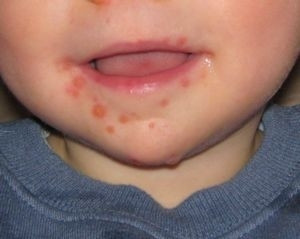Parents told to watch out for hand, foot and mouth disease after spate of cases in Manchester
First signs of childhood disease include high temperature, loss of appetite, a cough and sore throat and mouth.

Parents in Greater Manchester have been urged to look out for symptoms of hand, foot and mouth disease in their children after a spate of cases in the area.
Doctors warned the childhood illness had been "doing the rounds" in Heywood, Middleton and Rochdale, with NHS staff seeing a spike in cases at their clinics.
The disease is caused by a virus and is most common in children under the age of 10 due to their weak immune systems.
The first signs of an infection include a high temperature, loss of appetite, a cough and a sore throat and mouth.
A couple of days later children will then develop red spots on their tongue and inside their mouth, which can quickly develop into painful ulcers and make eating and drinking difficult.
Those infected may also notice a rash made up of small, red raised spots on their skin, typically on hands and the soles of their feet.
The spots, which in rare cases can also appear on the buttocks and groin, may then go on to develop into blisters with a greyish centre, becoming itchy and uncomfortable.
There is no cure to the illness and doctors advise parents to care for their child at home should they get infected.
They should give them plenty of fluids, offer softer foods to help make eating less painful and give them a safe level of paracetamol to help alleviate pain.
The disease is usually mild and clears up on its own within seven to 10 days.
The warnings were issued on the Heywood, Middleton and Rochdale (HMR) Paediatric Nurse Practitioners' Facebook page on Wednesday (11 October).
"We have had quite a few cases of hand, foot and mouth disease in our clinics lately so it seems it might be doing the rounds in Heywood, Middleton and Rochdale," it read.
"Viruses such as hand, foot and mouth are spread through close contact with infected people or contaminated surfaces. To help prevent the spread ensure you wash your hands and disinfect contaminated surfaces.
"Avoid allowing your child to share dummies and cups and wash clothing and bedding regularly.
"Children are safe to return to school or nursery as soon as they are feeling better. There is no need to stay off until the blisters have all healed as with viruses such as chicken pox."
However, doctors warned children should be taken to hospital if they display any of the following symptoms:
- Stops drinking or displays any signs of dehydration (Dry lips, mouth and eyes, reduced urine output, no tears when crying, sunken soft spot in babies).
- Has an altered conscious level (unusually tired or unrousable).
- Experiences seizures (fits).
- Is aged under three months and has a temperature of over 38 degrees Celsius.
- Is aged between three and six months and has a temperature of 39 degrees Celsius and above.
- If the skin becomes very painful, red, swollen, hot to touch or discharges puss.
- If symptoms don't improve after seven to 10 days.
Further information can be found at: beta.nhs.uk/conditions/hand-foot-and-mouth-disease/
To help your child recover from hand, foot and mouth disease you should do the following (source: HMR Paediatric Nurse Practitioners):
- Keep them at home until they are feeling better.
- Keep them hydrated - offer plenty of fluids and give younger children smaller, more frequent feeds.
- Offer soft foods. This will help if your child is experiencing a sore mouth or throat from the ulcers.
- Give Paracetamol to relieve pain and discomfort related to temperature (always follow the instructions on the box).






















